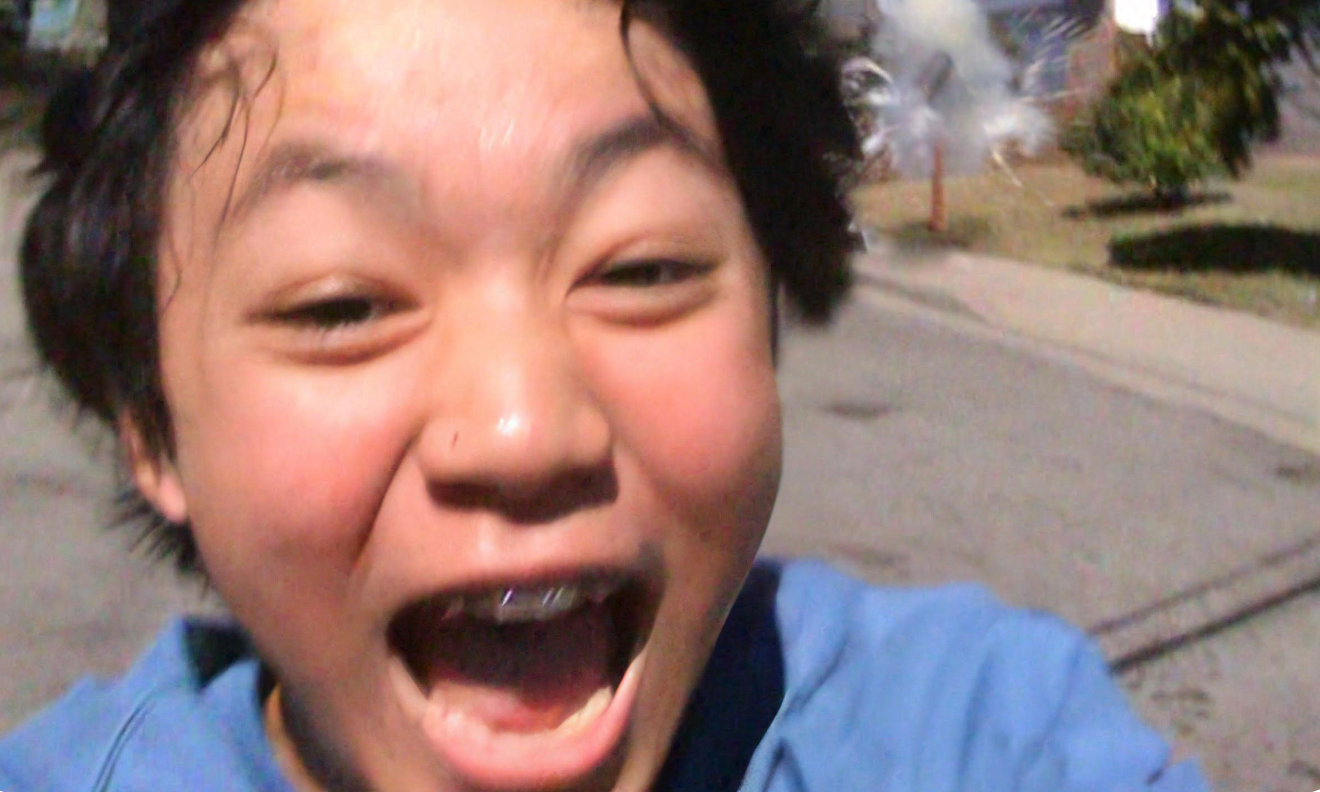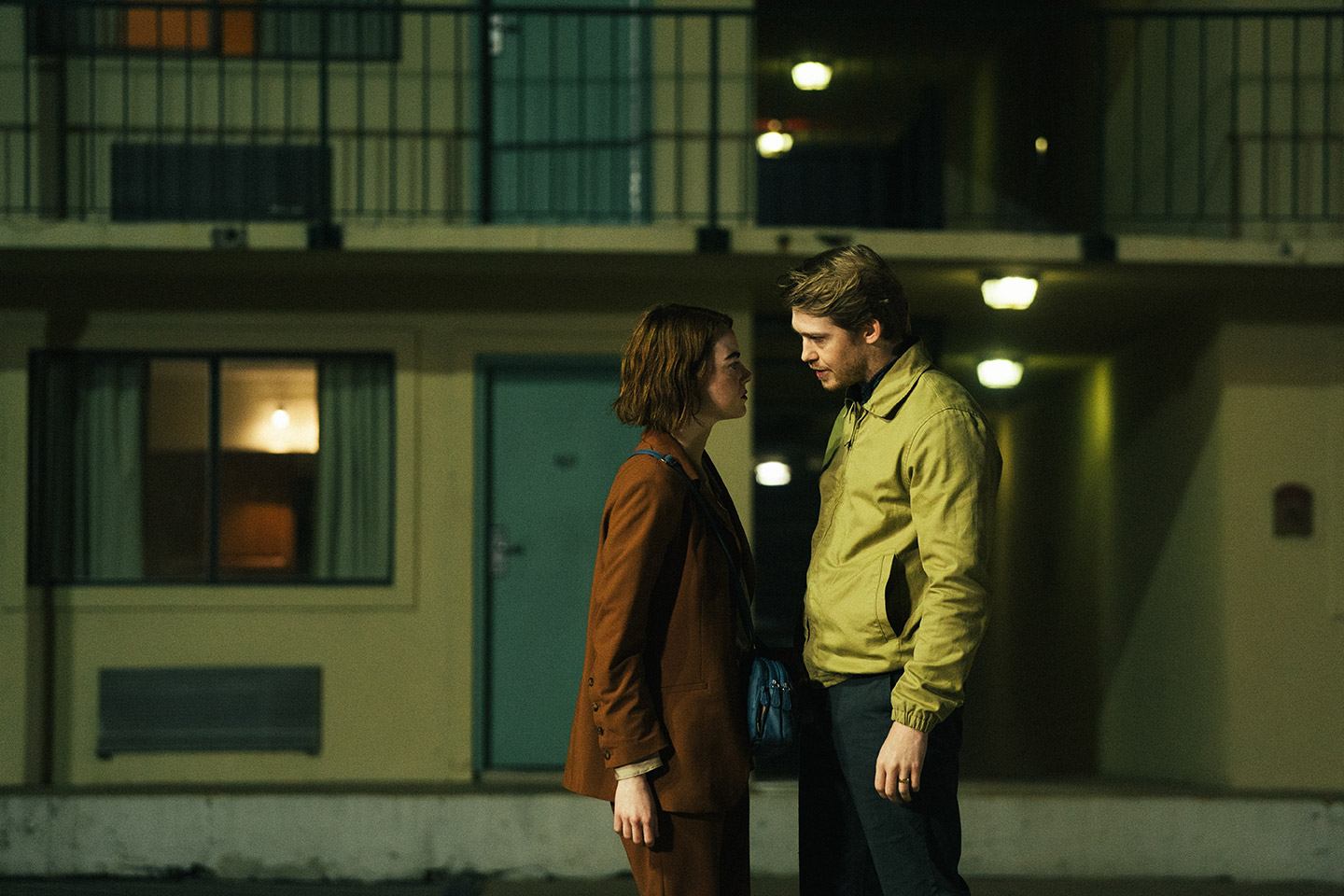Third Window Films: Luminous Woman (1987) - Reviewed
Images courtesy of Third Window FilmsAt the start of Luminous Woman (1987), Sensaku (played by professional wrestler Keiji Mutô) wanders barefoot into Tokyo's outskirts, sporting a well-worn pair of trousers and a furry vest. He has traveled all the way from Hokkaido in search of his fiancée, Kuriko (Narumi Yasuda), who left their small town a few years ago to attend classes in the big city. Kuriko has disappeared into the neon sprawl, neglecting to contact Sensaku in the interim, prompting him to undergo a journey to the urban jungle far from his simple life in the country. One of the first people Sensaku meets remarks, "You look like King Kong!". It's an astute observation as his giant stature and fish-out-of-water demeanor parallel the story of Kong in more than a few ways.Sensaku doesn't find himself on the glamorous side of Tokyo, as he is immediately noticed by Shiriuchi (Saburô Date), a sleazy club owner who runs a fight club on the dance floor of his establishment. He purports to know the location of Kuriko but will only divulge the information if Sensaku participates in his faux-gladiator setup. Oddly, while these brutal battles are ongoing, they are backed by elaborate musical and dance numbers, imparting a surreal carnival-like atmosphere. One of the performers, Yoshino (Michiru Akiyoshi), a depressed opera singer who has lost her voice, catches Sensaku's eye, but the bustle of the city and his preoccupation with finding Kuriko keep them at arm's length initially.Shinji Somai is fascinated by the lives of the marginalized and oppressed, as each character in Luminous Woman lives a troubled life. Yoshino struggles with her purpose in life, and when she loses the will to sing, she feels like she has lost her soul. The club owner, sensing her vulnerability, tries to exploit her sexually, reinforcing the misogynistic idea that women are only worth what they can provide with their bodies. Sensaku's roommate, Akunuma (Hide Demon), is a deteriorating alcoholic who never recovered emotionally from his wife leaving him. He is so violently drunk that he occasionally vomits up blood, preferring to spend his days in a stupor over confronting the reality of his divorce. Even innocent Kuriko has succumbed to the temptations of the underbelly of Tokyo, trading her schooling for nights of wild, drug-infused sexual encounters. The Tokyo in this film is hell, and Sensaku is the only one who can provide salvation.Luminous Woman has a unique violet-hued color grading that makes Tokyo look like a dreamy fantasy film, which fits the grand staging and bizarre tonal changes. Somai finds creative ways to frame conversations; in one scene, he has a character surrounded by tangled red ribbons as she talks on the phone, symbolizing her complicated relationship with others and her conflicted feelings. The way the narrative unfolds could be described as fairy-tale adjacent, and as it transitions into the third act, it becomes more implausible and over-the-top. Sensaku is a bigger-than-life character, at one point stripping utterly nude at the helm of a speeding boat while on his way to finally confront Shiriuchi. He is the knight-in-shining armor saving the princess from the evil monster, but sadly, in this story, the princess does not escape unscathed. Although this film can sometimes feel unfocused, it never wavers in its affection for humanity and how we simultaneously love and hurt each other. Sometimes, the only way to find yourself is through the eyes of another. Special Features:New 2k remaster from the original negativesMaking Of (50 minutes)Deleted Scenes (50 minutes)TrailerSlipcase with artwork from Gokaiju'Directors Company' edition featuring insert by Jasper Sharp - limited to 2000 copies--Michelle Kisner

 |
| Images courtesy of Third Window Films |
At the start of Luminous Woman (1987), Sensaku (played by professional wrestler Keiji Mutô) wanders barefoot into Tokyo's outskirts, sporting a well-worn pair of trousers and a furry vest. He has traveled all the way from Hokkaido in search of his fiancée, Kuriko (Narumi Yasuda), who left their small town a few years ago to attend classes in the big city. Kuriko has disappeared into the neon sprawl, neglecting to contact Sensaku in the interim, prompting him to undergo a journey to the urban jungle far from his simple life in the country. One of the first people Sensaku meets remarks, "You look like King Kong!". It's an astute observation as his giant stature and fish-out-of-water demeanor parallel the story of Kong in more than a few ways.
Sensaku doesn't find himself on the glamorous side of Tokyo, as he is immediately noticed by Shiriuchi (Saburô Date), a sleazy club owner who runs a fight club on the dance floor of his establishment. He purports to know the location of Kuriko but will only divulge the information if Sensaku participates in his faux-gladiator setup. Oddly, while these brutal battles are ongoing, they are backed by elaborate musical and dance numbers, imparting a surreal carnival-like atmosphere. One of the performers, Yoshino (Michiru Akiyoshi), a depressed opera singer who has lost her voice, catches Sensaku's eye, but the bustle of the city and his preoccupation with finding Kuriko keep them at arm's length initially.
Shinji Somai is fascinated by the lives of the marginalized and oppressed, as each character in Luminous Woman lives a troubled life. Yoshino struggles with her purpose in life, and when she loses the will to sing, she feels like she has lost her soul. The club owner, sensing her vulnerability, tries to exploit her sexually, reinforcing the misogynistic idea that women are only worth what they can provide with their bodies. Sensaku's roommate, Akunuma (Hide Demon), is a deteriorating alcoholic who never recovered emotionally from his wife leaving him. He is so violently drunk that he occasionally vomits up blood, preferring to spend his days in a stupor over confronting the reality of his divorce. Even innocent Kuriko has succumbed to the temptations of the underbelly of Tokyo, trading her schooling for nights of wild, drug-infused sexual encounters. The Tokyo in this film is hell, and Sensaku is the only one who can provide salvation.
Luminous Woman has a unique violet-hued color grading that makes Tokyo look like a dreamy fantasy film, which fits the grand staging and bizarre tonal changes. Somai finds creative ways to frame conversations; in one scene, he has a character surrounded by tangled red ribbons as she talks on the phone, symbolizing her complicated relationship with others and her conflicted feelings. The way the narrative unfolds could be described as fairy-tale adjacent, and as it transitions into the third act, it becomes more implausible and over-the-top. Sensaku is a bigger-than-life character, at one point stripping utterly nude at the helm of a speeding boat while on his way to finally confront Shiriuchi. He is the knight-in-shining armor saving the princess from the evil monster, but sadly, in this story, the princess does not escape unscathed.
Although this film can sometimes feel unfocused, it never wavers in its affection for humanity and how we simultaneously love and hurt each other. Sometimes, the only way to find yourself is through the eyes of another.
 |
Special Features:
New 2k remaster from the original negatives
Making Of (50 minutes)
Deleted Scenes (50 minutes)
Trailer
Slipcase with artwork from Gokaiju
'Directors Company' edition featuring insert by Jasper Sharp - limited to 2000 copies
What's Your Reaction?










































.jpg)


